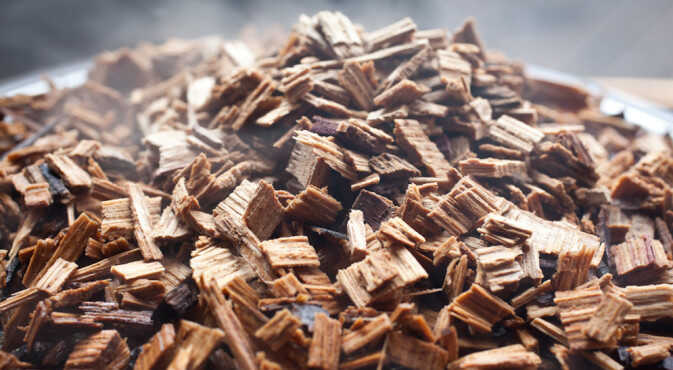
Defumação natural
- Quanto maior o tempo de defumação, maior será a perda de umidade, o que consequentemente resultará em uma proporção mais elevada de sal. O produto torna-se mais seco e mais salgado, mas atinge um prazo de validade muito maior.
- Um suprimento de ar úmido é necessário durante a defumação, o que normalmente é controlado por uma válvula de abertura no defumador. A saída da fumaça também precisa ser controlada por uma tampa de exaustão ou partículas de madeira ou fuligem podem começar a se acumular, afetando a aparência e o sabor do produto.
- Outra condição da câmara de defumação e provavelmente a mais importante de todas é a umidade da superfície do produto no momento em que a fumaça é aplicada. Uma superfície úmida absorve fumaça muito melhor do que a superfície seca; consequentemente a umidade relativa na câmara de fumaça é crítica. Isso afetará a cor da fumaça e a intensidade do sabor de defumado. Uma superfície úmida resultando em uma cor de fumaça mais intensa e mais escura. No entanto, a umidade superficial excessiva produzirá uma cor marrom lamacenta ou mesmo tons de cor preta e, às vezes, cores entremeadas se a condensação da superfície ocorrer durante a aplicação de fumaça.
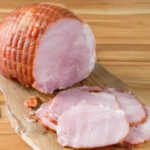
presunto defumado - Praticamente todos os processos do defumação incluem um primeiro passo de secagem do produto no início do ciclo. Isso é feito para remover a condensação da superfície. Uma regra geral sugerida é que a superfície do produto deve ficar pegajosa antes da aplicação da fumaça. Se uma maior deposição de fumaça é desejada, é mais eficaz iniciar a aplicação de fumaça mais cedo no processo. Quanto mais úmido o produto maior será a intensidade de cor.
- A principal vantagem reivindicada para a defumação natural é um sabor autêntico e completo. As desvantagens incluem problemas de emissão de poluentes no ar, resultantes do escape de fumaça e a presença de hidrocarbonetos aromáticos policíclicos (PAH). Alguns dos compostos PAH, particularmente benzopireno e dibenzantracina, são cancerígenos. Estes compostos podem ser reduzidos na defumação fumo natural controlando a temperatura de geração de fumaça(ideal entre 315°C a 345°C) e são reduzidos em produtos líquidos ou condensados de fumaça líquida. Pesquisas recentes também descreveram a tecnologia de filtragem reduzindo em 90% a PAH, sem perda significativa dos componentes do aroma.
- Quanto mais elevada for a temperatura do defumador, mais curto o tempo de defumação e menor será a vida de prateleira do produto.
- Quanto mais baixa for a temperatura do defumador, melhor será a penetração da fumaça e mais longa terá que ser a defumação. Isso resulta em um melhor sabor e uma longa vida de prateleira.

Defumador digital - Tipos de madeiras diferentes resultam em sabores diferentes. Se possível, experimente misturar tipos distintos de madeiras para criar sabores únicos. Evite madeiras que contenham resinas ou qualquer tratamento químico, como verniz ou tinta.
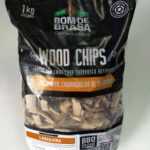
lascas madeira defumacao laranjeira - Deixe a carne ou salsicha destampadas para secar na geladeira por uma noite antes de defumar. Com menos umidade escorrendo pelo produto a fumaça irá penetrar mais facilmente e formar uma película externa bem mais saborosa. Produtos muito úmidos também pegam sabor, mas com menos intensidade.
Fumaça líquida
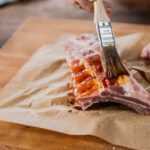
- Muitos frigoríficos começaram a usar produtos de fumaça líquida ou “fumaça condensada”. São produzidos a partir de fumaça natural por pirólise controlada de madeira e coleta da fumaça, seguida por condensação e filtragem para remover impurezas como o PAH. O resultado é uma fumaça condensada na forma líquida que contém os mesmos compostos funcionais (carbonilas, fenóis, ácidos e álcoois) que a fumaça natural.
- A fumaça líquida tem várias pontos positivos que levaram ao aumento de seu uso. A intensidade do sabor, por exemplo, é facilmente controlável e é consistentemente reproduzível. Além disso, a fumaça líquida pode ser misturada ou injetada com outros ingredientes durante o processamento para proporcionar um sabor mais uniforme no produto. Esta abordagem também pode fornecer um impacto antimicrobiano em patógenos potenciais, incluindo Listeria, Salmonella, E. coli e Staphylococci.
- Há também vantagens para a fumaça líquida na variedade de métodos de aplicação. A cor da superfície do produto, por exemplo, pode ser obtida por imersão, pulverização, atomização ou uso de invólucros com fumaça. A atomização é a geração de uma névoa muito fina e é aplicada em uma câmara fechada de maneira não muito diferente da fumaça natural, enquanto a imersão e a pulverização são métodos que funcionam bem em estufas/câmaras de defumação. Para invólucros/tripas com fumaça, a fumaça líquida é incorporada nas tripas durante a fabricação e transferida para o produto após o embutimento.
- Outra vantagem da fumaça líquida é que estufas e câmaras de defumação acumulam menos depósitos de cinzas nas paredes e nas superfícies dos dutos, problemas mais frequentes no uso da fumaça natural.
-
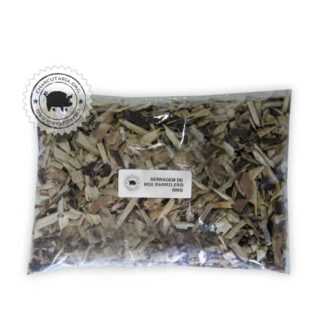 Serragem grossa Wood Chips Mix ParrileroR$ 15,00
Serragem grossa Wood Chips Mix ParrileroR$ 15,00 -
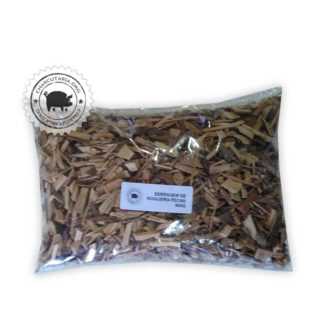 Serragem grossa Wood Chips Nogueira PecanR$ 15,00
Serragem grossa Wood Chips Nogueira PecanR$ 15,00 -
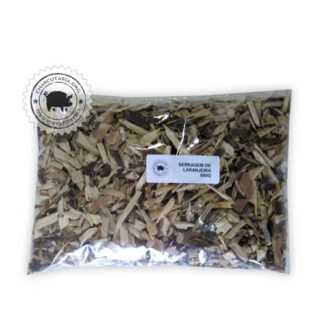 Serragem grossa Wood Chips LaranjeiraR$ 15,00
Serragem grossa Wood Chips LaranjeiraR$ 15,00 -
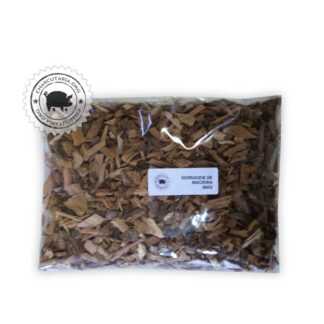 Serragem grossa Wood Chips MacieiraR$ 15,00
Serragem grossa Wood Chips MacieiraR$ 15,00 -
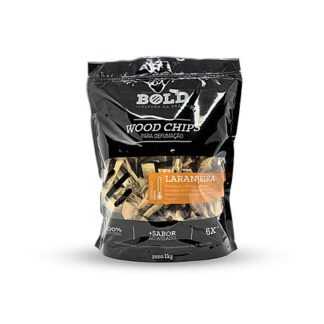 Lascas Wood Chips de Laranjeira para defumaçãoR$ 35,00
Lascas Wood Chips de Laranjeira para defumaçãoR$ 35,00 -
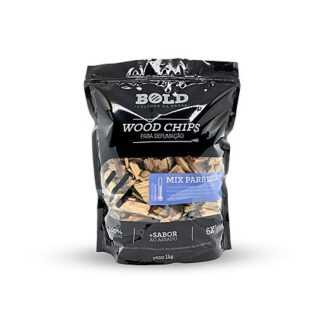 Lascas Wood Chips de Madeira Mix ParrileroR$ 35,00
Lascas Wood Chips de Madeira Mix ParrileroR$ 35,00 -
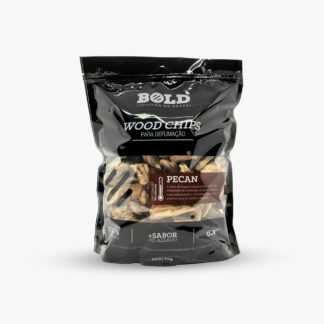 Lascas de Nogueira Pecan para defumaçãoR$ 35,00
Lascas de Nogueira Pecan para defumaçãoR$ 35,00 -
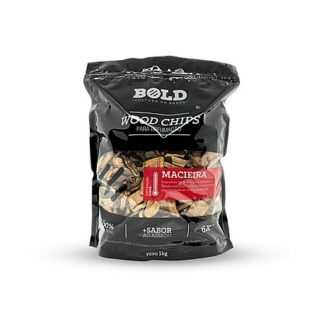 Lascas de Macieira para defumaçãoR$ 35,00
Lascas de Macieira para defumaçãoR$ 35,00

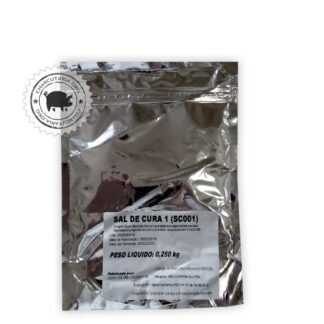
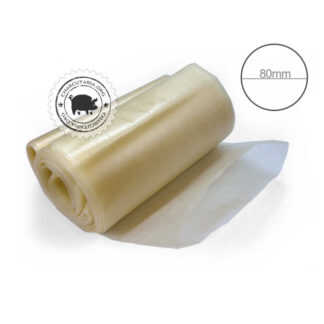
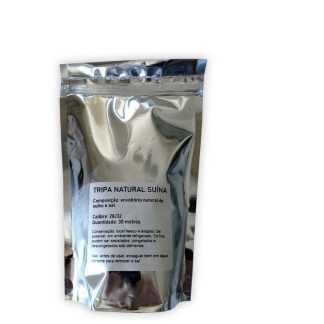
Bom dia, podia dizer qual o defumador que vemos utilizar, nomeadamente o que se vê no video fabrico do black ham.
Obrigado
Defumador fenix da empresa produxxi
Olá gostaria muito de saber se posso usar fumaça liquida na fabricação de salame onde o processo é realizado na geladeira sem o uso de defumador??
Obrigado e muito sucesso!!!
Pode sim, conforme foi feito nesta receita de salame colonial ou aplicando a fumaça líquida diretamente na massa, junto com os demais condimentos.
Ingazeiro serve pra de fumar?
Oi Aledio boa tarde, vc acabou descobrindo se ingazeiro presta pra defumar?
Posso usar fumaça liquida na fabricação de linguiça caseira?
Pode sim. Líquida ou em pó.
Amigo posso usar lenha de caramuru?
Boa Noite. Uso caramboleira. Mas não descasco. É preciso descascar?
Não precisa descascar
tem alguma madeira que nao serve para defumaçao quais?
Boa noite, hj faço defumação usando somente lenha, porém é muito complicado e cansativo manter a temperatura. Se eu passar a usar gás, para temperatura e serragem como fonte de fumaça apenas, deixarei de estar na categoria artesanal?
Gostaria de sugestões de cursos de defumação.
Prefiro cursos presenciais.
Bom dia, preciso saber a quantidade de sal de cura na proporção para o sal de cozinha.
Me indicaram realizar uma mistura de 9 colheres de sal de cozinha para uma de salde cura, esta quantidade será reservada em um recipiente fechado e utilizado quando necessário.
Esta correto?
Pelos cálculos o limite da anvisa é de 2,4g de sal de cura para cada kg de carne, então veja quanto dessa mistura vai aplicar por quilo de carne e confira se o sal de cura que comprou segue o padrão de proporções desse cálculo, que pode ser visto com mais detalhes no post http://charcutaria.org/aditivos-alimentares/sal-de-cura-o-que-e-e-quanto-usar/
Boa Tarde,
Aonde encontro serragem de boa qualidade em São Paulo?
Att
Marco Henrique
Aonde encontro serragem de boa qualidade em São Paulo?
Vc acha no mercado livre…..use de cedro ou eucalipto…….pesquize serragem para defumação compre 10 kilos que sai mais em conta, use serragem tamanho médio ou fina a grossa não faz muito fumaça
Além do mercado livre, pode ligar para marcenarias próximas e perguntar se vendem(ou dão) as sobras. Só confirme que não há resina ou qualquer outro produto aplicado na madeira. Tem que ser madeira limpa sem resina.
Por que a pele do bacon defumado está difícil de tirá-la? Será que é muito tempo de defumação? Preciso retirá-la para fatiar o bacon pra enrolar medalhões. Agradeço se possível uma resposta, obrigado!
Sempre a pele é mais rígida. Isso é normal. Nunca se utiliza a pele a não ser em receitas específicas.